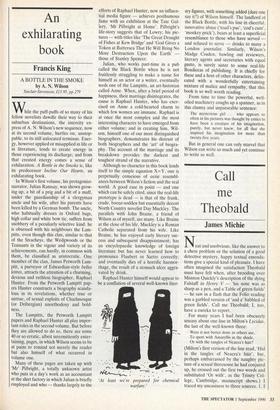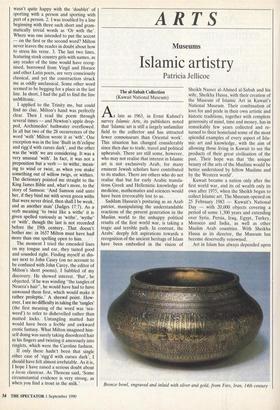Call me Theobald
James Michie
Neat and unobvious, like the answer to a chess problem or the solution of a good detective mystery, happy textual emenda- tions give a special kind of pleasure. I have often imagined the satisfaction Theobald must have felt when, after brooding over Mistress Quickly's description of the dying Falstaff in Henry V — 'his nose was as sharp as a pen, and a Table of green fields' — he saw in a flash that the Folio reading was a garbled version of 'and a' babbled of green fields'. Call me Theobald; I, too, have a eureka to report.
For many years I had been obscurely uneasy about one line in Milton's Lycidas, the last of the well-known three:
Were it not better done as others use, To sport with Amaryllis in the shade, Or with the tangles of Neaera's hair?
(Milton's first version of the line read, 'Hid in the tangles of Neaera's hair', but, perhaps embarrassed by the naughty pic- ture of a sexual threesome he had conjured up, he crossed out the first two words and substituted 'Or with', as the Trinity Col- lege, Cambridge, manuscript shows.) I traced my uneasiness to three sources. 1. I wasn't quite happy with the 'doublet' of sporting with a person and sporting with part of a person. 2. I was troubled by a line beginning with three such short and gram- matically trivial words as 'Or with the'. Where was one intended to put the accent — on the first or the second word? Milton never leaves the reader in doubt about how to stress his verse. 3. The last two lines, featuring stock country girls with names, as any reader of the time would have recog- nised, borrowed from Virgil and Horace and other Latin poets, are very consciously classical, and yet the construction struck me as oddly unclassical. Some other word seemed to be begging for a place in the last line. In short, I had the gall to find the line unMiltonic.
I applied to the Trinity ms, but could find no clue. Milton's hand was perfectly clear. Then I read the poem through several times — and Newton's apple drop- ped, Archimedes' bathwater overflowed. In all but two of the 28 occurrences of the word 'with' Milton wrote it as 'wth'. One exception was in the line 'Built in th'eclipse and rigg'd with curses dark', and the other was the 'with' we are considering. It was a very unusual 'with'. In fact, it was not a preposition but a verb — to withe, mean- ing to wind or twist, as when you make' something out of willow twigs, or withies. The dictionary pointed me straight to the King James Bible and, what's more, to the story of Samson: 'And Samson said unto' her, if they bind me with seven green withs: that were never dried, then shall I be weak,' and as another man' (Judges 17:7). As a, verb meaning `to twist like a withe' it is given spelled variously as `withe', `wythe'' or 'with', though the last is not recorded before the 19th century. That doesn't. bother me: in 1637 Milton must have had) more than one spelling open to him.
The moment I tried the emended lines on my tongue and ear, they tasted good and sounded right. Finding myself at din- ner next to John Casey (on no account to be confused with John Carey, the editor of Milton's short poems), I babbled of my discovery. He showed interest. 'But', he objected, 'if he was winding "the tangles of Neaera's hair", he would have had to have unwound them first, which would make it rather proleptic.' A shrewd point. How- ever, I see no difficulty in taking the 'tangles' (the first meaning of the word was 'sea- weed') to refer to dishevelled rather than matted locks. Untangling matted hair would have been a feeble and awkward erotic fantasy. What Milton imagined him- self doing was surely taking disordered hair in his fingers and twisting it amorously into ringlets, which were the Caroline fashion.
If only there hadn't been that single other case of `rigg'd with curses dark', I should have felt almost irrefutable. As it is, I hope I have raised a serious doubt about a locus classicus. As Thoreau said, 'Some circumstantial evidence is very strong, as when you find a trout in the milk.'



















































 Previous page
Previous page